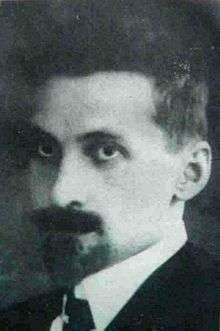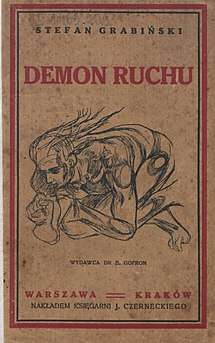Stefan Grabiński
Stefan Grabiński (26 February 1887 - 12 November 1936) was a Polish writer of fantastic literature and horror stories. He is sometimes referred to as the "Polish Poe" or "Polish Lovecraft", although his works are often surrealistic or explicitly erotic in a way that sets him apart from both. He was an expert in parapsychology, magic and demonology and had an interest in the works of the German Expressionist filmmakers.
Stefan Grabiński | |
|---|---|
 c. 1920-1930 | |
| Born | Stefan Grabiński 26 February 1887 Kamionka Strumiłowa, Poland |
| Died | 12 November 1936 (aged 49) Lwów |
| Pen name | Stefan Żalny |
| Occupation |
|
| Nationality | Polish |
| Alma mater | Lviv University |
| Period | Early 20th-century |
| Genre | Horror |
A number of his stories have been translated into English by Miroslaw Lipinski and published as The Dark Domain. His story "Szamota's Mistress" was adapted to film as part of a B Movie trilogy called Evil Streets.
Biography
Grabiński was born in Kamionka Strumiłowa, then part of Poland (present-day Kamianka-Buzka, Ukraine), situated by the Bug River. His family was well off as his father, Dionizos, was a local judge, but Stefan's childhood was marred because of his proneness to various illnesses. He often read while lying in bed, which made him slightly reclusive and nurtured his bias in favor of dark fantasy and mysticism. After his father's death, the family moved to Lviv.
He graduated from the local high school in 1905, then studied Polish Literature and philology at the former Jan Kazimierz University, which is presently the Ivan Franko National University of Lviv. While a student there, he discovered that he had tuberculosis, which was common in his family.

As he was an ardent pantheist, fond of Christian mysticism and Eastern religious texts, as well as Theosophy and demonology, this discovery only enhanced his occult worldview and approach to writing. Upon graduating in 1911, he began work as a secondary school teacher in Lviv. During this time, he also traveled extensively, visiting Austria, Italy, and Romania. From 1917 to 1927, he was a teacher in Przemyśl.
He first began to write short fiction in 1906 and his mother was his first reader and critic. A collection of short stories, Exceptions: In the Dark of Faith (Z Wyjątków. W Pomrokach Wiary), written under the pen name Stefan Żalny (Żalny means 'doleful') became his self-published debut in 1909. These tales have never been judged highly. The general opinion being that his hyperbolical, at times anachronistic literary style couldn't be appreciated by the majority of his readers. His second volume of short stories, On the Hill of Roses (Na Wzgórzu Róż), was published 9 years later, and received modest critical approval.
However, this book impressed Polish decadent writer and literary critic Karol Irzykowski. They became good friends, and Irzykowski supported Grabiński’s career. In 1920, Grabiński presented a collection of his mystic railway stories called The Motion Demon (Demon Ruchu). Eventually, the following collections of short stories appeared: Pilgrim’s Madness (Szalony Pątnik, 1920), An Incredible Story (Niesamowita Opowieść) and The Book of Fire (Księga Ognia, 1922). His longest prose work, Passion (Namiętność), written in 1930, was inspired by his trip to Italy, most notably Venice.
The symbolic imagery of Grabiński's works was embodied by eerie creatures, such as incubi, witches, doppelgängers, spirits of various sorts, and mysterious messages from the underworld. His fiction is usually considered bizarre because it is permeated with magic, occult eroticism, parapsychological effects, and Oriental mysticism.
A quote from his short story "Saturnin Sektor", is said to reflect his usual state of mind: "I cannot free myself from that strong, commanding voice which speaks to me, or from that mysterious power which pushes aside objects, contemptuous of their size; I am still wearied by endless monotonous roads that led nowhere. That is why I am not a perfect spirit, only an 'insane person', someone who arouses in normal people pity, contempt or fear. But I do not complain. Even like this, I am better off than those of healthy mind.”
His tuberculosis worsened and he was forced to spend more time seeking treatment. In 1931, he settled in the resort and spa town of Brzuchowice (now Briukhovychi) where, despite some recent financial return for his writings, he increasingly fell into obscurity and was abandoned by most of his friends. In 1936, he died in extreme poverty in Lviv and is buried there at Janowski Cemetery.
His work was largely forgotten until after World War II, when the literary historian Artur Hutnikiewicz wrote a monograph on his work. Later his stories were promoted by the science-fiction critic, Marek Wydmuch and some appeared in the Stanisław Lem Collection, published by Wydawnictwo Literackie. Since the 1980s, his popularity has once again declined.
Bibliography
Novels
- Salamandra (Salamander) (1924)
- Cień Bafometa (Baphomet's Shadow) (1926)
- Klasztor i morze (The Cloister and the Sea) (1928)
- Wyspa Itongo (Itongo Island) (1936)
Short Stories
- Puszczyk (The Tawny Owl) (1906)
- Szalona zagroda (The Frenzied Farmhouse) (1908)
- Wampir (The Vampire) (1909)
- Pomsta ziemi (The Earth's Revenge) (1909)
- Klatwa (The Curse) (1909)
- Podzwonne (Death Knell) (1909)
- Na wzgorzu roz (On the Hill of Roses) (1909)
- Sad umarlych (The Orchard of the Dead) (1909)
- W willi nad morzem (At the Villa by the Sea) (1912)
- Na wzgorzu roz (On the Hill of Roses) (1912)
- Cien (Shadow) (1913)
- Czad (Fumes) (1913)
- W domu Sary (At Sara's House) (1915)
- Szary pokoj (The Grey Room) (1915)
- Po stycznej (On a Tangent) (1918)
- Zez (Strabismus) (1918)
- Problemat Czelawy (The Problem of Czelawa) (1918)
- Slepy tor (The Siding) (1918)
- Projekcje (Projection) (1919)
- Pani z Bialego Kasztelu (The Lady from the White Castle) (1919)
- Ksenia (Ksenia) (1919)
- Maszynista Grot (Engine Drive Grot) (1919)
- Bledny pociag (The Wandering Train) (1919)
- Sygnaly (Signals) (1919)
- Smoluch (The Sloven) (1919)
- Ultima Thule (Ultima Thule) (1919)
- Saturnin Sektor (Saturnin Sektor) (1920)
- Falszywy alarm (False Alarm) (1920)
- Krol Nenufar (King Nenufar) (1920)
- Cud Zywii (The Miracle of Zywia) (1921)
- Za rychlo (Too Soon") (1921)
- Bialy Wyrak (White Wyrak) (1922)
- Muzeum dusz czysccowych (The Museum of Purgatorial Spirits) (1922)
- Dziwna stacja (The Strange Station) (1922)
- Zemsta zywiolakow (Vengeance of the Elementals) (1922)
- Kochanka Szamoty (Szamota's Mistress) (1922)
- Strych (The Attic) (1930)
- Pojednanie (Reconciliation) (1930)
- Zmora (Nightmare) (1930)
- Projekcje (Projections) (1930)
Collections
- Z wyjatkow. W pomrokach wiary (From the Unusual. In the Shadows of Belief) (1909)
- Na wgórzu róż (On the Hill of Roses) (1918)
- Demon ruchu (The Motion Demon) (1919)
- Szalony pątnik (Mad Pilgrim) (1920)
- Niesamowita opowieść (An Eerie Tale) (1922)
- Księga ognia (The Book of Fire) (1922)
- Namiętność (Passion) (1930)
Plays
- Willa nad morzem (Ciemne siły) (Dark Forces)
- Zaduszki (All-Souls' Day)
Titles in English
All translated by Mirosław Lipinski
- On the Hill of Roses, Hieroglyphic Press (2012) ISBN 1-908876-03-4
- The Dark Domain, Dedalus Classics (2013) ISBN 1-909232-04-1
- The Motion Demon, CreateSpace (2013) ISBN 1-4664-1976-8
- Passion, NoHo Press (2014) ISBN 0-615-97850-9
Translated by Wiesiek Powaga
- In Sarah's House, CB Editions (2007) ISBN 0-955-72853-3
See also
- List of horror fiction authors
References
External links
| Wikimedia Commons has media related to Stefan Grabiński. |
- Works by or about Stefan Grabiński at Internet Archive
- Page at Internet Speculative Fiction Database
- Works by Stefan Grabiński at LibriVox (public domain audiobooks)

- The Dark Domain
- The Motion Demon
- Grabinski on Facebook
- 101 Weird Writers #45 — Stefan Grabiński
- Stefan Grabiński
- In search of Stefan Grabinski
- China Miéville bemoans the dearth of translations of Stefan Grabinski's pioneering horror fiction